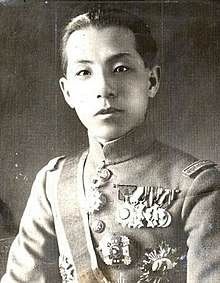
Back Zhang Xueliang Catalan Čang Süe-liang Czech Zhang Xueliang Danish Zhang Xueliang German Ĉang Hsueliang Esperanto Zhang Xueliang Spanish Zhang Xueliang Estonian Zhang Xueliang Finnish Zhang Xueliang French ג'אנג צ'ואליאנג HE
You can help expand this article with text translated from the corresponding article in Chinese. Click [show] for important translation instructions.
|
Chang Hsueh-liang | |
|---|---|
張學良 | |
 Chang in 1928 | |
| Warlord of Manchuria | |
| In office June 4, 1928 – December 26, 1936 | |
| Preceded by | Zhang Zuolin |
| Succeeded by | Office abolished |
| Personal details | |
| Born | June 3, 1901 Tai'an County, Fengtian, Qing Empire |
| Died | October 15, 2001 (aged 100) Honolulu County, Hawaii, United States |
| Resting place | Valley of the Temples Memorial Park, Honolulu County, Hawaii |
| Nationality | Chinese |
| Spouses | Yu Feng-chih
(m. 1916; div. 1964)Edith Chao Chang
(m. 1964; died 2000) |
| Domestic partner | Gu Ruiyu (1924–1931) |
| Children | 5 |
| Parent |
|
| Relatives | Zhang Xueming (brother) |
| Awards | Order of Rank and Merit Order of Wen-Hu Order of the Sacred Treasure Order of Blue Sky and White Sun |
| Nickname | Young Marshal |
| Military service | |
| Allegiance |
|
| Branch/service | |
| Rank | General of the Army[citation needed] |
| Commands | Northeast Peace Preservation Forces |
| Battles/wars | |
| Chang Hsueh-liang | |||||||||||
|---|---|---|---|---|---|---|---|---|---|---|---|
| Traditional Chinese | 張學良 | ||||||||||
| Simplified Chinese | 张学良 | ||||||||||
| |||||||||||
Chang Hsueh-liang (Chinese: 張學良; June 3, 1901[note 1] – October 15, 2001), also romanized as Zhang Xueliang and known later in life as Peter H. L. Chang, was a Chinese warlord who ruled Manchuria from 1928 to 1936 and the commander-in-chief of the Northeastern Army after the assassination of his father, Zhang Zuolin. A reformer who was sympathetic to nationalist ideas, he completed the official reunification of China at the end of the Warlord Era by pledging loyalty to the Nationalist government in Nanjing. He nonetheless retained Manchuria's de facto autonomy until the Empire of Japan invaded and occupied the region in 1931. He was frustrated by Chiang Kai-shek's policy of "first internal pacification, then external resistance" and helped plan and lead the 1936 Xi'an Incident. Northeastern soldiers under Chang's command arrested Chiang to force him to negotiate a Second United Front with the Chinese Communist Party against Japan. Chiang eventually agreed, but upon his release he had Chang arrested and sentenced to 50 years of house arrest, first in mainland China and then in Taiwan. Although never personally a communist, Chang is regarded by the Chinese Communist Party and the People's Republic of China as a patriotic hero for his role in ending the encirclement campaigns and beginning the war of resistance against Japan.[1][2][3][4][5]
Cite error: There are <ref group=note> tags on this page, but the references will not show without a {{reflist|group=note}} template (see the help page).
- ^ Kristof, Nicholas D. (October 19, 2001). Baquet, Dean; Louttit, Meghan; Corbett, Philip; Chang, Lian; Drake, Monica; Kahn, Joseph; Kingsbury, Kathleen; Sulzberger, A.G.; Levien, Meredith Kopit; Caputo, Roland A.; Bardeen, William; Dunbar-Johnson, Stephen; Brayton, Diane (eds.). "Zhang Xueliang, 100, Dies; Warlord and Hero of China". National news. The New York Times. Vol. CL, no. 210. p. C13. ISSN 0362-4331. OCLC 1645522. Archived from the original on October 24, 2009. Retrieved July 25, 2021.
- ^ "Tribute for Chinese hero". BBC News. October 16, 2001. Retrieved July 21, 2002.
- ^ 张学良老校长. neu.edu.cn. Archived from the original on August 16, 2012. Retrieved August 15, 2012.
- ^ 张学良先生今逝世 江泽民向其亲属发去唁电. chinanews.com. October 15, 2001. Retrieved October 16, 2001.
- ^ 伟大的爱国者张学良先生病逝 江泽民发唁电高度评价张学良先生的历史功绩. people.com.cn. October 16, 2001. Archived from the original on October 27, 2018. Retrieved October 17, 2001.
© MMXXIII Rich X Search. We shall prevail. All rights reserved. Rich X Search